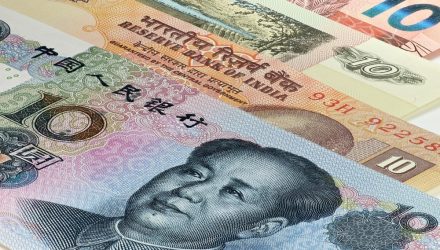Getting emerging markets (EM) exposure can be a volatile affair since their performance is often tied to local currencies, but there are options to counteract this effect with funds like the FlexShares Emerging Markets Quality Low Volatility Index Fund (QLVE).
The fund seeks investment results that correspond generally to the price and yield performance of the Northern Trust Emerging Markets Quality Low Volatility Index. This index is designed to reflect the performance of a selection of companies that, in aggregate, possess lower overall absolute volatility characteristics relative to a broad universe of securities domiciled in emerging market countries.
It’s an opportune time for QLVE, which can capture upside in emerging markets while limiting volatility should the dollar regain strength. The Federal Reserve recently stood pat on interest rates, but EM countries may be tightening their monetary policy faster than the Fed.
“Emerging-market currencies hit by a hawkish Federal Reserve may soon regain their record run against the dollar on expectations that developing central banks may outpace their U.S. counterpart in policy tightening,” a Bloomberg article said.
“The currencies of Brazil, the Czech Republic, Hungary and Poland — countries that delivered multiple rate hikes or are expected to do so soon — are retaining quarterly gains and outperforming peers,” the article added, noting that the Fed recently stated it wouldn’t start raising rates until 2023.
“A more hawkish Fed could provide a hawkish and FX-friendly impulse for some EM central banks that were thinking of their own policy shifts,” and “may nudge others significantly in that direction,” said Goldman strategists Zach Pandl and Kamakshya Trivedi.
“Our main arguments for EM FX appreciation over the medium and long runs — value, hiking cycles that contribute to domestic carry rebuilds, and vaccine-led cyclical recoveries — should continue to provide support over the summer in a way that is not entirely determined by Fed decision-making,” the strategists added.
Nevertheless, investors should be careful to not lump different countries into a single basket.
“The shift toward tighter monetary policy in developing nations isn’t uniform, however,” the Bloomberg article mentioned. “Some are continuing to support growth as the coronavirus continues to spread, or a new wave of cases emerges.”

